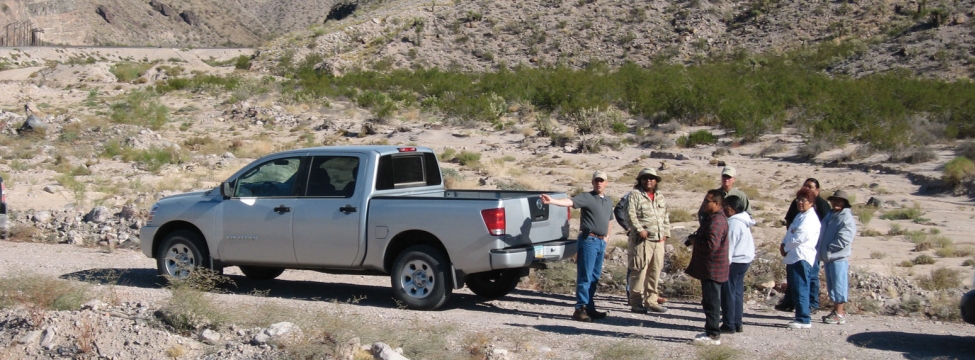To serve you better, our new website displays information specific to your location.
Please visit the site and bookmark it for future use.
The U.S. National Environmental Policy Act and Native Americans
The successful engagement and consultation with Native American Tribes for major federal actions, under the U.S. National Environmental Policy Act (NEPA) and other laws, requires using both formal and informal facilitation processes to resolve possible conflicts.
SRK is involved worldwide meeting impact and consultation requirements at the international, national and local level. In the United States, the NEPA is the guiding force for public disclosure and consultation on environmental and social impacts involving federal actions. The Act mandates that impacts to environmental, social and cultural resources are evaluated and made known.
For the past four years, Bill Morrill, Principal Consultant for SRK Reno has been the contract Project Manager for the U.S. Department of the Interior’s Bureau of Land Management (BLM), overseeing the preparation and completion of a NEPA Environmental Impact Statement for constructing and operating Toquop, a proposed coal-fired, electric-generating power plant and rail line in southeastern Nevada. Concerns over predicted greenhouse gas emissions and other air and water issues from the plant generated significant public interest.
Prominent stakeholders in the consultation process were the Moapa Paiute and Kaibab Paiute Tribes, descendents of the peoples living on the North American continent before the arrival of European settlers. In addition to their environmental concerns, the Tribes expressed very strong preference for avoiding potential impacts to historical and cultural properties. Since the Tribes hold “governmental” status, in some ways independent from the U.S. Government, a separate consultation path was required.
Recognising this, it was by adhering to the formal, and informal, consultation process that a climate of resolution resulted. Throughout the project, all potentially affected Tribes were invited to meetings and consultations including: scoping the issues before collecting baseline information; attending regular briefings on the project; site visits; establishing collateral cooperation between cultural officers; and addressing sociological and cultural issues raised by the Tribes.
A critical issue for both Paiute Tribes was the discovery of rock drawings and ceremonial circles that would be impacted by the project. Through consultation, the issue was resolved with agreement to examine, catalogue and most importantly, preserve the artifacts by the BLM, if the project was approved. It was the process of consultation through communication that resolved possible conflicts.
William (Bill) Morrill: wmorrill@srk.com
SRK is involved worldwide meeting impact and consultation requirements at the international, national and local level. In the United States, the NEPA is the guiding force for public disclosure and consultation on environmental and social impacts involving federal actions. The Act mandates that impacts to environmental, social and cultural resources are evaluated and made known.
For the past four years, Bill Morrill, Principal Consultant for SRK Reno has been the contract Project Manager for the U.S. Department of the Interior’s Bureau of Land Management (BLM), overseeing the preparation and completion of a NEPA Environmental Impact Statement for constructing and operating Toquop, a proposed coal-fired, electric-generating power plant and rail line in southeastern Nevada. Concerns over predicted greenhouse gas emissions and other air and water issues from the plant generated significant public interest.
Prominent stakeholders in the consultation process were the Moapa Paiute and Kaibab Paiute Tribes, descendents of the peoples living on the North American continent before the arrival of European settlers. In addition to their environmental concerns, the Tribes expressed very strong preference for avoiding potential impacts to historical and cultural properties. Since the Tribes hold “governmental” status, in some ways independent from the U.S. Government, a separate consultation path was required.
Recognising this, it was by adhering to the formal, and informal, consultation process that a climate of resolution resulted. Throughout the project, all potentially affected Tribes were invited to meetings and consultations including: scoping the issues before collecting baseline information; attending regular briefings on the project; site visits; establishing collateral cooperation between cultural officers; and addressing sociological and cultural issues raised by the Tribes.
A critical issue for both Paiute Tribes was the discovery of rock drawings and ceremonial circles that would be impacted by the project. Through consultation, the issue was resolved with agreement to examine, catalogue and most importantly, preserve the artifacts by the BLM, if the project was approved. It was the process of consultation through communication that resolved possible conflicts.
William (Bill) Morrill: wmorrill@srk.com
|
You can download a PDF of the entire |
PDF A4
|
PDF Letter
|
|
|
|
Our newsletters focus on specific areas of interest to earth resource professionals and clients. Each is available as an Adobe Acrobat PDF file. If you don't already have Adobe's PDF reader, you can download it free.


